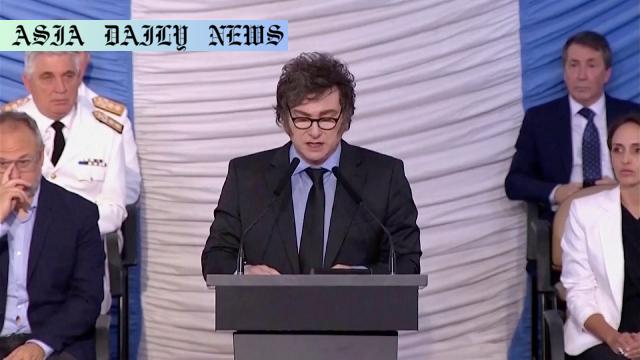Argentina withdraws from World Health Organization citing differences on health management and alleged lack of independence.
- Argentina announces its withdrawal from the World Health Organization.
- President Milei cites health management differences and alleged lack of WHO independence.
- The move resembles former US President Trump’s decision to leave WHO.
- Argentina may also consider exiting the Paris Agreement, signaling broader policy shifts.

Argentina’s Decision to Exit WHO: A Global Shake-Up
Argentina has announced its departure from the World Health Organization (WHO), marking a significant geopolitical development attributed to policy alignments with former U.S. President Donald Trump. President Javier Milei cited irreconcilable differences over health management, especially during the COVID-19 pandemic, as the basis for the decision. He also raised concerns about the WHO’s perceived lack of independence and susceptibility to the influence of certain nation-states.
The Context of Milei’s Policy Decisions
Milei, often referred to as “Argentina’s Trump,” has made waves on the international stage with dramatic and controversial decisions. The withdrawal from the WHO follows closely on the heels of the United States’ similar move under Trump’s administration. Since Trump signed an executive order pulling the U.S. out of the global health organization early in his new term, the WHO has faced financial and strategic challenges due to the loss of its largest contributor. Similarly, Argentina’s own withdrawal raises questions about global unity in health crises.
Health Management Differences and Pandemic Response
During the COVID-19 pandemic, many governments criticized the WHO’s approach to health management. Argentina’s government alleges that the health body showcased inefficiency in responding to the crisis and claims that undue political influence undermines its credibility. Milei argued that Argentina must prioritize sovereignty and accountability over reliance on international health authorities perceived as compromised.
Echoing Trump’s Policy Footsteps
This decision not only mirrors Trump’s withdrawal from the WHO but also signals a growing trend of Argentina aligning itself more closely with U.S. policies. Reports suggest that President Milei was one of the first foreign leaders to meet Trump after his re-election, and he even attended the latter’s recent inauguration. The growing affinity between the two leaders appears to have influenced Argentina’s significant policy redirections.
Financial Ramifications and Global Backlash
The WHO has relied heavily on contributions from prominent member countries like the U.S., which accounted for a substantial portion of its overall budget. Argentina’s withdrawal similarly risks cutting another financial lifeline. While Argentina’s contributions are significantly smaller than those made by the U.S., the cumulative effect of multiple withdrawals may impair the WHO’s ability to execute essential programs, especially in developing nations.
Potential Departure from the Paris Agreement
In what could be another policy echo of the Trump administration, Argentina’s government has suggested it may also withdraw from the Paris Agreement. This renowned international climate pact has been a cornerstone for global cooperation in fighting climate change. Abandoning this framework would further isolate Argentina on the international stage and could damage both its foreign relations and environmental commitments.
Implications for Global Health and International Relations
The cumulative effect of these withdrawals undermines collective efforts to address global challenges. A fragmented international system risks leaving smaller or developing nations vulnerable to health and environmental crises. Critics fear that Argentina’s decisions—if adopted by other nations—could lead to a domino effect that weakens multilateral organizations reliant on solidarity and cooperation.
A Historic Shift in Argentine Policies
President Javier Milei’s bold steps to withdraw from key international agreements signal a historic shift in Argentine policies. The controversial approach has pundits divided—some say a move toward national sovereignty is essential, while others argue this marks a dangerous precedent of isolationism. Either way, Argentina’s decisions are undeniably reshaping its role on the global stage.
Conclusion
Argentina’s withdrawal from the WHO is a significant geopolitical event that underscores growing divisions in global governance. Alongside the U.S., Argentina’s decision casts a shadow over the future effectiveness of multilateral organizations. While debates rage about national sovereignty versus global collaboration, the true impact of these policy changes will unfold in the coming years.



Commentary
Argentina’s Shift to Isolationism
Argentina’s decision to leave the World Health Organization represents a significant pivot in its foreign and domestic policies. The alignment of policies with Trump’s administration signals a calculated move toward reinforcing sovereignty while potentially sacrificing global alliances. This is a bold step, sparking both applause and criticism locally and abroad.
The Challenges of Sovereignty vs. Cooperation
One cannot deny the allure of asserting national sovereignty in challenging times. By withdrawing from international agreements, the Argentine government is asserting its independence in decision-making. However, the interconnected nature of global health and climate challenges underscores the importance of collective action. In cutting ties with the WHO and potentially the Paris Agreement, Argentina risks alienating itself from a network of critical global support systems.
Potential Consequences for Global Unity
Argentina’s withdrawal reflects a broader fracturing within global governance systems. If other nations follow in its footsteps, collaborative efforts to combat global crises may face severe setbacks. International bodies like the WHO depend on sustained contributions and trust from member states to operate effectively. The loss of not just financial resources but also legitimacy could have devastating long-term consequences.
Looking Toward the Future
The world now watches Argentina closely, assessing the broader implications of its actions. While the emphasis on independent policymaking is commendable in principle, the execution must account for interdependencies that transcend borders. Balancing autonomy with cooperation remains the ultimate challenge in achieving sustainable policy outcomes for any nation.